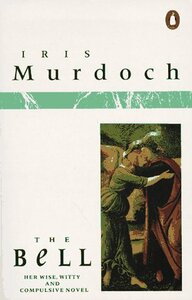You need to sign in or sign up before continuing.
Take a photo of a barcode or cover
adventurous
mysterious
reflective
medium-paced
Plot or Character Driven:
Character
Strong character development:
Complicated
Loveable characters:
No
Diverse cast of characters:
No
Flaws of characters a main focus:
Yes
bold, but a liiitle bit more finesse was needed.
More than thrilled to have finally gotten to my Iris Era. Complex, surprisingly funny, and full of think-y curiosities.
dark
emotional
reflective
slow-paced
This book has a beautiful plot and characters, is clearly written by someone dedicated to the craft of writing. That said, it felt a little heady for me - I wanted to feel more by the end than I ended up feeling.
I read seven of Iris Mudoch’s novels in 2024 and this one is objectively probably the best, but I found it the hardest to review. I finished it in May and I’m writing this review in December because I kept putting it off every month.
Perhaps the reason is that there is not much to laugh at. One of the things I love about Iris Murdoch is her irreverent sense of humour. She can be iconoclastic and is not afraid to portray characters in all their moral ugliness, while inviting you to see things from their point of view, and even to develop an affection for them. She does this largely through dialogue. Her descriptions are riveting but it’s often her dialogue that makes you laugh.
The dialogue in The Bell is somewhat serious. Most of the action in the novel takes place in a lay religious community in a place called Imber Court. At the beginning we are shown this place through the eyes of Dora, who is a bit dim.
She deliberately shuts things out of her memory and is not very curious. She is vain and assesses everything in terms of how it reflects on her. But what little curiosity she has is shut down quickly in Imber Court by the po-faced Mrs. Mark.
As with many things in Iris Murdoch’s novels there is a lot to unpack here. Once you start to look at the detail there is a lot to say. And yet Mrs Mark is a relatively minor figure who does not have much influence over events.
Dora herself becomes a very interesting character who experiences a number of inner transformations. At first, Iris Murdoch has fun with her, mocking her shallowness. Turning up to join her dry academic husband (and leaving behind her more easygoing lover), Dora is perturbed to find she is not the only attractive woman there.
But then Dora becomes the catalyst by which the hypocrisy and delusions of the other characters are exposed.
The bell of the title is a symbol of all that is wrong at Imber Court. The Abbey, which is home to an ancient order of Benedictine nuns, was cursed by the Bishop when a lover of one of the nuns fell from its high wall and broke his neck. The bell flew into the lake and the guilty nun drowned herself.
The bell can be seen as an instrument of truth and candour that booms out whenever lies are being told and sexual feelings are being denied.
A new bell is being prepared but Dora and a handsome young boy called Toby plot to replace the new one with the old after Toby has dragged it up from the lake. This, of course, is loaded with symbolic significance, but, as usual with Murdoch’s symbols, quite how it should be interpreted is largely up to you.
Like the nun’s lover, Toby wants to climb over the wall to where the nuns live.
What he doesn’t know is that the gate is never locked these days. A nun greets him pleasantly and shows him the way out. Desperate to lose his innocence, Toby “began to run down the avenue, anxious to get as far away as possible from the dangerous and it now seemed to him even more impregnable enclosure. He felt ridiculous, humiliated and ashamed.”
He gets his chance, later, with Dora in the middle of the night. Falling upon her in a passionate embrace, they roll together into the mouth of the bell.
This occurs about two-thirds of the way into the story. There is much more of this sort of thing still to come.
All the professional critics and commentators say this is one of Murdoch’s best novels. She felt so herself, I think, although her assessment was that she was ‘fortunate’ with the way things came together.
I still haven’t made up my mind about it. I need to read it again, which I will probably do in 2025. I find the symbolism heavy-handed and the humour, if it is humour, almost as leaden as the bell.
Still, there is a lot of food for thought in it. Ever the philosopher, Murdoch claimed she didn’t write philosophical novels. To some extent that’s true. She is invariably more playful in her novels than in her overtly philosophical works and it’s obvious that in her novels she gave her imagination free reign to explore human behaviour in a way that was perhaps not possible in the confines of a stuffy and traditional academic institution.
But still, there is a lot of philosophy in her novels. Commenting on one of Kant’s anecdotes about how disappointing it can be to discover you have been fooled by an imitation, one of the characters comments wryly “I think the moral is don’t be found out.”
Iris Murdoch is undoubtedly interested in uncovering psychological truth. She writes with painstaking accuracy, whether she is describing how to trap and put a ring on a goldcrest, how to haul a bell out of a lake, or how a sensitive, heterosexual adolescent boy reacts to being kissed by a man in whom he has placed his trust. The precision of her prose is in itself a pleasure. It can be very poetic. But, more than this, her psychological insights are uncanny and always worth the effort.
I should stop there but I can’t resist saying that The Bell will resonate for me well into the new year and beyond.
Perhaps the reason is that there is not much to laugh at. One of the things I love about Iris Murdoch is her irreverent sense of humour. She can be iconoclastic and is not afraid to portray characters in all their moral ugliness, while inviting you to see things from their point of view, and even to develop an affection for them. She does this largely through dialogue. Her descriptions are riveting but it’s often her dialogue that makes you laugh.
The dialogue in The Bell is somewhat serious. Most of the action in the novel takes place in a lay religious community in a place called Imber Court. At the beginning we are shown this place through the eyes of Dora, who is a bit dim.
“She lived in an atmosphere of factitious and self-conscious frivolity, picturing herself as an irresponsible Bohemian.”
She deliberately shuts things out of her memory and is not very curious. She is vain and assesses everything in terms of how it reflects on her. But what little curiosity she has is shut down quickly in Imber Court by the po-faced Mrs. Mark.
“‘You’ll think me an awful wet blanket,’ said Mrs Mark, ‘but, do you know, we never discuss our past lives here. That’s another little religious rule that we try to follow. No gossip. And when you come to think of it, when people ask each other questions about their lives, their motives are rarely pure, are they? I’m sure mine never are! Curiosity that is idle soon degenerates into malice.’”
As with many things in Iris Murdoch’s novels there is a lot to unpack here. Once you start to look at the detail there is a lot to say. And yet Mrs Mark is a relatively minor figure who does not have much influence over events.
Dora herself becomes a very interesting character who experiences a number of inner transformations. At first, Iris Murdoch has fun with her, mocking her shallowness. Turning up to join her dry academic husband (and leaving behind her more easygoing lover), Dora is perturbed to find she is not the only attractive woman there.
“Dora felt an immediate twinge of displeasure. She realized that she had been assuming that if she had to decorate so uncongenial a scene she would at least be the only beautiful girl upon it. A woman of the appearance of Mrs Mark was quite in place here. But the figure she had just seen was disturbing, like a portent, menacing almost.”
But then Dora becomes the catalyst by which the hypocrisy and delusions of the other characters are exposed.
The bell of the title is a symbol of all that is wrong at Imber Court. The Abbey, which is home to an ancient order of Benedictine nuns, was cursed by the Bishop when a lover of one of the nuns fell from its high wall and broke his neck. The bell flew into the lake and the guilty nun drowned herself.
The bell can be seen as an instrument of truth and candour that booms out whenever lies are being told and sexual feelings are being denied.
A new bell is being prepared but Dora and a handsome young boy called Toby plot to replace the new one with the old after Toby has dragged it up from the lake. This, of course, is loaded with symbolic significance, but, as usual with Murdoch’s symbols, quite how it should be interpreted is largely up to you.
Like the nun’s lover, Toby wants to climb over the wall to where the nuns live.
“The desire to see inside the enclosure had taken violent hold upon him. He had once more, and to an unprecedented degree, the disturbing sense of being about to pass through the looking-glass. The wall presented just the right degree of difficulty. It was an obstacle but not an insuperable one.”
What he doesn’t know is that the gate is never locked these days. A nun greets him pleasantly and shows him the way out. Desperate to lose his innocence, Toby “began to run down the avenue, anxious to get as far away as possible from the dangerous and it now seemed to him even more impregnable enclosure. He felt ridiculous, humiliated and ashamed.”
He gets his chance, later, with Dora in the middle of the night. Falling upon her in a passionate embrace, they roll together into the mouth of the bell.
“As they did so the clapper, moving within the dark metal hollow, struck violently against the side, and a muted boom arose and echoed away across the lake whose waters had now once again subsided to rest.”
This occurs about two-thirds of the way into the story. There is much more of this sort of thing still to come.
All the professional critics and commentators say this is one of Murdoch’s best novels. She felt so herself, I think, although her assessment was that she was ‘fortunate’ with the way things came together.
I still haven’t made up my mind about it. I need to read it again, which I will probably do in 2025. I find the symbolism heavy-handed and the humour, if it is humour, almost as leaden as the bell.
Still, there is a lot of food for thought in it. Ever the philosopher, Murdoch claimed she didn’t write philosophical novels. To some extent that’s true. She is invariably more playful in her novels than in her overtly philosophical works and it’s obvious that in her novels she gave her imagination free reign to explore human behaviour in a way that was perhaps not possible in the confines of a stuffy and traditional academic institution.
But still, there is a lot of philosophy in her novels. Commenting on one of Kant’s anecdotes about how disappointing it can be to discover you have been fooled by an imitation, one of the characters comments wryly “I think the moral is don’t be found out.”
Iris Murdoch is undoubtedly interested in uncovering psychological truth. She writes with painstaking accuracy, whether she is describing how to trap and put a ring on a goldcrest, how to haul a bell out of a lake, or how a sensitive, heterosexual adolescent boy reacts to being kissed by a man in whom he has placed his trust. The precision of her prose is in itself a pleasure. It can be very poetic. But, more than this, her psychological insights are uncanny and always worth the effort.
I should stop there but I can’t resist saying that The Bell will resonate for me well into the new year and beyond.
adventurous
emotional
funny
reflective
sad
tense
medium-paced
Plot or Character Driven:
Character
Strong character development:
Yes
Loveable characters:
Yes
Flaws of characters a main focus:
Yes
This is one of those books I'm glad to have read but can't really imagine who I would recommend it to. There's a lot to love if you enjoy psychological studies and quirky English villages, but it's so overly descriptive and meandering I spent the entire middle stretch trying to decide if I should just give up and read something else.
It is really well observed, and Murdoch spends a huge amount of time showing all the little shifts in thought and mood of her characters in a way that makes them extremely vivid after a while. And it's interesting in its nuanced and ultimately affectionate portrayal of a homosexual character (the book was published in the 50s, which makes it all the more interesting). That being said, there's a completely inappropriate relationship between a teacher and student at one point, and we only get the predator's framing of that story, which felt really, really icky to me.
I'll be thinking about this one for a while.
It is really well observed, and Murdoch spends a huge amount of time showing all the little shifts in thought and mood of her characters in a way that makes them extremely vivid after a while. And it's interesting in its nuanced and ultimately affectionate portrayal of a homosexual character (the book was published in the 50s, which makes it all the more interesting). That being said, there's a completely inappropriate relationship between a teacher and student at one point, and we only get the predator's framing of that story, which felt really, really icky to me.
I'll be thinking about this one for a while.
informative
inspiring
mysterious
reflective
medium-paced
Plot or Character Driven:
A mix
Strong character development:
Yes
Loveable characters:
Yes
C’est plus un 3,5 mais c’est surprenamment moderne. Et toujours bravo les nonnes.
mysterious
reflective
tense
medium-paced
Plot or Character Driven:
Character
Strong character development:
Complicated
Loveable characters:
Complicated
Diverse cast of characters:
No
Flaws of characters a main focus:
Yes
Moderate: Adult/minor relationship, Emotional abuse, Infidelity, Mental illness, Suicide
Minor: Homophobia, Misogyny, Religious bigotry, Schizophrenia/Psychosis , Alcohol
challenging
dark
emotional
reflective
slow-paced
Plot or Character Driven:
Character
Strong character development:
Complicated
Loveable characters:
Complicated
Diverse cast of characters:
Complicated
Flaws of characters a main focus:
Yes
dark
emotional
slow-paced
Plot or Character Driven:
Character
Strong character development:
Yes
Loveable characters:
Complicated
Diverse cast of characters:
Yes
Flaws of characters a main focus:
Yes



